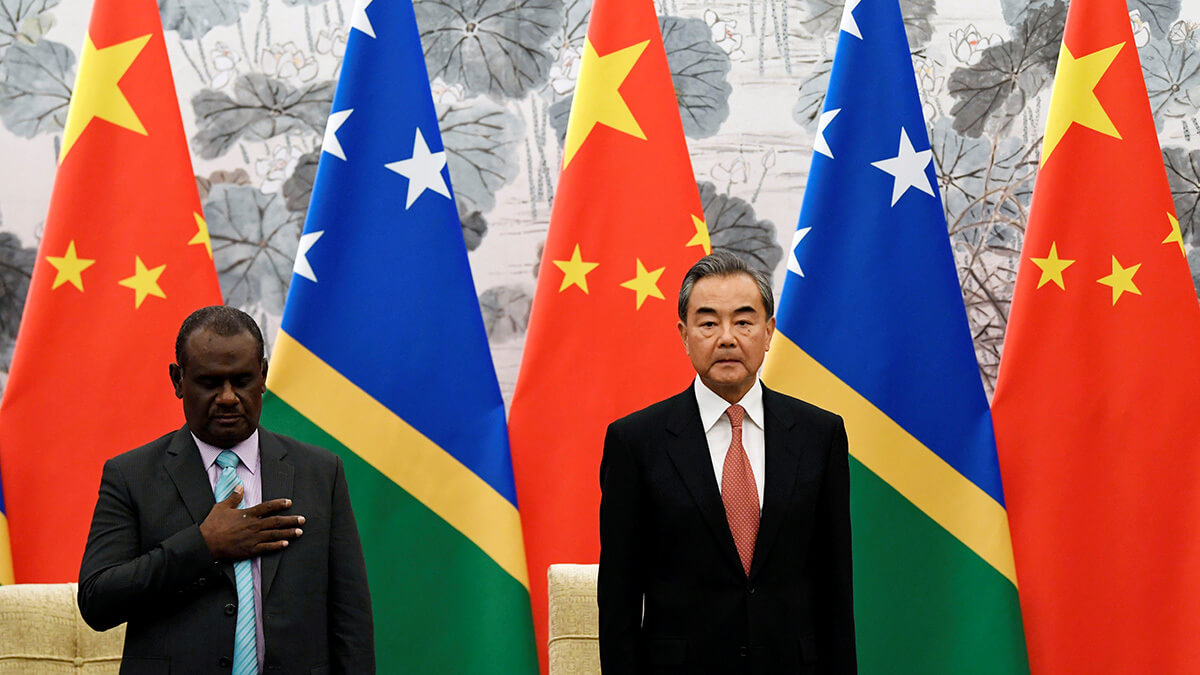Chinese state-owned media house Global Times (GT) announced on Thursday that the country had conducted joint police training with the Solomon Islands earlier this month following the signing of a security deal between the two countries earlier this year.
In an exclusive interview with GT, Police Commissioner Third Class Zhang Guangbao, the leader of the China Police Liaison Team to the island nation, shared details of the training. “The police cooperation between China and the Solomon Islands is not a threat to regional security and stability, but has effectively promoted these elements,” Zhang said. He added that “some countries” are “feeling threatened” because they “do not want to see China’s influence in the South Pacific region.”
The China Police Liaison Team is comprised of nine officers from the Ministry of Public Security, People’s Public Security University of China, and the Beijing Municipal Public Security Bureau. Zhang said that the officers are experts in “police training, public order management, police liaison, and communication technology.”
He revealed that their main task is to help the island’s local police in strengthening “capacities in public management, response to riots, the maintenance of social stability, law, order, and security, and the protection of life and property for all residents in the Solomon Islands, in accordance with the working principles of professionalism, efficiency, friendliness and openness, transparency, and goodwill.”
The training included barehanded combat skills and was further “enhanced with the use of police equipment and tactics,” including learning response measures in case of an attack. Martial arts were also a major highlight of the training. “We combined martial arts and grappling, and our local colleagues were very interested in it, because they of course all know Bruce Lee and Jackie Chan. We taught them martial arts moves which they had never seen before,” Zhang said.
A local news article added that the training also included drill posture, duty performance, alert and block, freehand skills, equipment skills, firearm handling, and close protection tactics.
Exclusive: China-Solomon Islands police training enhances friendship, law-enforcement capacity after Chinatown losses - Global Times https://t.co/oyFq9AyZWl
— David Griffiths (@DavidGr07837209) July 28, 2022
Zhang stressed that the training delivered by the Chinese authorities was “not only professional and practical, but also sincere and unreserved.” He also remarked that the demonstration on July 1 showed “better results than anticipated.”
The Solomon Islands’ Prime Minister, Manasseh Sogavare, who watched the demonstration along with Chinese Ambassador to Honiara, Li Ming, declared: “I feel safer.”
In a similar vein, National Emergency Management & Special Event Planning Director Mr. Francis Ramoni said, “These training programs are very professional, relevant and effective which was warmly welcomed by RSIPF. It is overwhelming and heartfelt to see that RSIPF receive training from one of the best police forces in the world.”
The police training is part of a security deal between Honiara and Beijing for which Sogavare had received intense international flak in March. A draft of the security deal between the was leaked online, raising alarm over growing Chinese encroachment into the Pacific island region. The draft showed that the agreement would allow China to further expand its presence in the region by basing navy warships in the Pacific. The document enables Beijing to station Chinese armed police, military, and “other law enforcement and armed forces” in the Solomons. Notably, the deal outlined the potential for the establishment of a naval base on the island.
Reacting to the leak, then-Australian Minister for Defence Peter Dutton had said that Canberra “would be concerned” if “any military base” is established less than 2,000 kilometres off its coast. “We want peace and stability in the region. We don’t want unsettling influences and we don’t want pressure and coercion that we are seeing from China continuing to roll out in the region,” Dutton added.
Another littoral neighbour, New Zealand, had also expressed its misgivings about the Chinese security deal. PM Jacinda Ardern had said that her administration is “gravely concerned” about the “potential militarisation of the region.
In response, Sogavare said it was “insulting to be branded as unfit to manage our sovereign affairs or have other motives in pursuing our national interest.”
At the same time, however, he has reassured Australia that he will not allow China to build a military base on the island and that Australia would remain the Solomon Islands’ “security partner of choice.” Australian Prime Minister Anthony Albanese responded by saying that he is “very confident” about Sogavare’s promise. Australian Foreign Minister Penny Wong also welcomed the comments, saying that “regional security is “a joint responsibility and it is a responsibility of the Pacific family.” “We may not have been perfect, but we are family,” she noted.
Moreover, Australia already has a similar bilateral security agreement with the Solomon Islands that covers the deployment of police and armed forces. Signed in 2018, the same agreement allowed Canberra, at the request of PM Sogavare, to lead a policing mission to restore order in the wake of riots on the island in 2021. Coincidentally, the riots were fuelled by the population’s displeasure with the government switching diplomatic ties from Taiwan to China. However, the PM has maintained that Chinese investment was essential for the nation’s development.
As of now, there have been no reports of a military base. Reacting to the perceived “China threat,” Zhang said that the “smear tactics” were all rooted in geopolitics. “They (Western countries) are judging from their own standpoint, which is not objective or fair,” he said.

